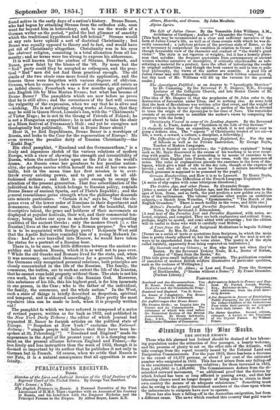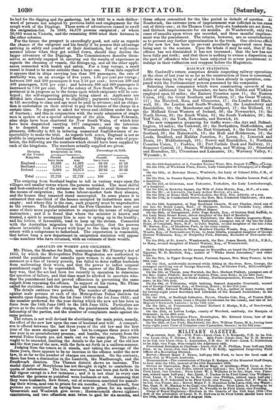Oltratings friun tt 931nt 93unko.
THE DOUBLE EXODUS.
Those who,felt alarmed lest Ireland should be drained of her labour- ing population under the attraction of free passages, a hearty welcome and the promise of plenty to eat on the other side of the Atlantic, will. take courage from the report recently issued by the Colonial Land and Emigration Commissioners. For the year 1853, there has been a decrease' to the extent of 13,376 persons or about 7 per cent of the estimated number who emigrated in, 1852. 'This has not arisen from any falling-off in the remittances from prosperous relatives ; for these increased in 1863, from 1,404,0001. to 1,439,0001. The Commissioners deduce from the di- minished outward movement, "an additional proof that the distress by which Ireland has been' so long afflicted is passing away, and that her labouring classes need no longer despair of being able to obtain in their own country the means of an adequate subsistence." Something must also be owing to the greatly diminished numbers of the class upon whom the inducements to emigrate have now to operate.
There has also been a falling-off in the Australian emigration, but from a different cause. The news which reached this country that gold was to'
be had for the digging and the gathering, led in 1852 to a. rush thither- ward of persons not adapted by previous habit and employment- for the rough work of the Diggings. These sorts of adventurers ceased to swell the emigration-list. In 1858, 34,578.: persons emigrated ; of whom 26,683 went to Victoria, and the remaining 8000 tried their fortunes in the other colonies.
For the future the prospect is exceedingly good, not only as regards the. chance of the emigrant and.his family if he possess that advantage arriving in safety and comfort at their destination, but of well-remu- nerated labour when they get settled' down, should they decline the larger adventure of the Diggings. The Commissioners describe them- selves as actively engaged in carrying out the results of experience as regards the choosing of vessels, the fittings-up, and all the other appli- ances connected with health and safety. For a long voyage, a small vessel is found to be more suitable than a large one. From data supplied it appears that in ships carrying less than 200 passengers, the rate of mortality was, on an average of five years, 1.61 per cent per voyage ; between 200 and 300 passengers it was 2.18 per Cent; between 300 and 400 passengers, 3.02 per cent ; and between 500 and 600 passengers it increased to 7.03 per cent. For the colony of New. South Wales' an ex- periment is in progress as to the terms upon which emigrants will be con- ',eyed; the self-supporting principle being aimed at. Applicants are divided into classes according to eligibility ; payments varying from 11. to 15k according to class and age must be paid in advance; and an obliga- tion is undertaken on their arrival to pay the balance of the charge in a certain time. No deposit is asked for wives and children under the age of fourteen ; and this in conjunction with the ready admission of single men is spoken of as a special advantage of the plan. Since February, nine. ships have_ been chartered for New South Wales, of which four have • been despatehed carrying 1077 emigrants; and the intention is to despatch four vessels a month. In making up the com- plements, difficulty is felt in inducing unmarried Englishwomen of re- spectability to make the trial. As regards both sexes, England is not so prolific in emigrants as Ireland and Scotland; Taking the ratio of popu- lation, the following are the numbers which should have been supplied by each of the kingdoms. The numbers actually supplied are given. Division Emigration Government in 1853. Percentage in 1853. of the United Kingdom
England Scotland Ireland Total.
The outgoing from Scotland begins to tell in various ways upon the villages and smaller towns where_ the persons resided. The most skilful mid bestsonducted of the artisans are the readiest tosvail themselves of the means of emigration ; the home labour-market feels their absence, and the houses they tenanted- stand unoccupied. In some places it is estimated that one-third of the houses occupied by industrioui men are empty; and where this is the case, such property must be unproductive to the owners. The Established. and the Free Churches have sent -out some of their more popular ministers to organize the means of religious. instruction ; and it is found that where the minister is known and: trusted, a spirit to accompany him is sure to spring up in the locality ; and his letters, if favourable, tend to keep up the stream. Connected. with the Australian migration is this peculiarity, that the persons almost invariably look forward with hope to, the time when they may return with a competence to fatherland. The expectation is reasonable, that before long a new department in emigration statistics will appear —the numbers who .have returned, with:an.estimate of their wealth-
Should have been
Actually was Should have been Actually was
18,208 ...,. 11,393 65.68 .. 41.10 2,911 .. 6,357 .... 1040 ..
1932.
6,601 .. 10,973 23•82 .. 3948 27,723 .. 27,723 .... 100 .. 100

























 Previous page
Previous page